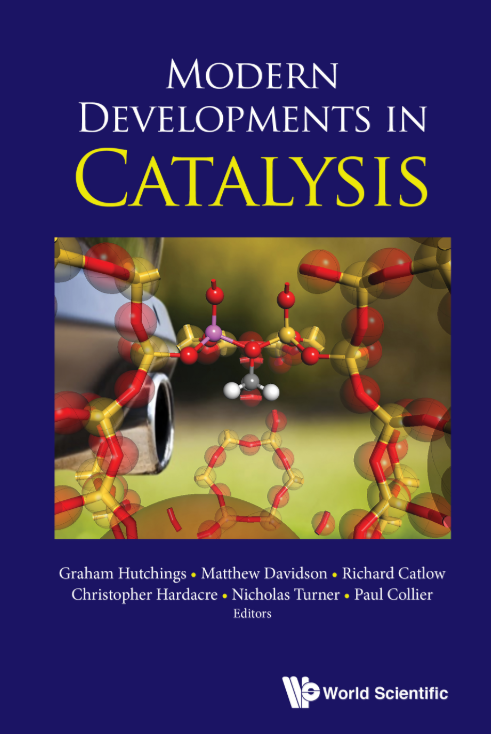
The UK Catalysis Hub collaborated to publish a book titled, “Modern developments in Catalysis”. The book is a series of chapters reviewing on the present state of catalysis research. Chapters focus on the breadth of the field of catalysis including biocatalysis, homogenous and heterogeneous catalysis, operando and in situ techniques, modelling and theoretical studies including life cycle analysis. The book sets out to explain to a reader interested in chemistry, the cutting-edge topics in the important field of catalysis.
Why a book on catalysis?
Catalysis is an important process that underpins everyday life for many of us. Without catalysis most of the manufactured goods and many food-stuffs would not be possible. The contribution of catalysis to manufacturing is almost 40% of global GDP, making development and innovation within the field integral to industry. This book highlights the latest concepts in a number of key areas and includes many powerful examples of how catalysis can impact society and also how catalysis science is making use of the most advanced capabilities and techniques to shed light on how catalytic processes work.
Professor Rutger A van Santen of Eindhoven University of Technology said of the book, “The book has been written at the level of chemistry and chemical engineering graduate students. It provides a very accessible and useful guide to those who are interested in current state of the art and applications of catalytic science.”
Modern Developments in Catalysis provides a review of evolving research and practise in catalysis, focussing on five main themes: catalysis design, environmental catalysis, catalysis and energy, chemical transformation and biocatalysis and biotransformations.
Topics range from complex reactions to the intricacies of catalyst preparation for supported nanoparticles, with nine chapters which illustrate the challenges facing catalytic sciences and the directions in which the field is progressing.
Edited by world renown academics in catalysis and leaders of the UK Hub, this book provides insight into one of the most important areas of modern chemistry – it represents a unique learning opportunity for students and professionals studying and working towards speeding-up, improving and increasing the rate of catalytic reactions in science and industry.
Professor Michael Bowker of Cardiff University said of the book, “The world is changing fast, and so is catalysis. This book focuses on new developments in the field relating very much to the themes of sustainability, atom efficiency and the environment. This, together with coverage of the wide range of catalysis, from metal nanoparticles to enzyme core synthesis, and considering frontier developments in operand/in-situ experimental methods, makes it an important read for practitioners in the field.”
Each chapter was written by research associates working on Catalysis Hub projects and representing universities across the country. The book was edited by the theme leaders of the Catalysis Hub with input from Paul Collier (Johnson Matthey) to give an industrial perspective.
Where to find it
This book is sold at major bookstores at GBP £115. More information on the book can be found at http://www.worldscientific.com/worldscibooks/10.1142/q0035




